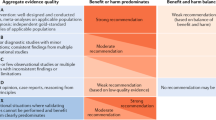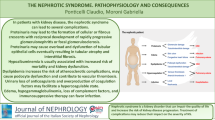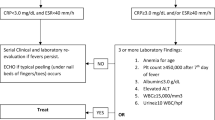Abstract
The aim of the study is to investigate how renal involvement is correlated with frequency of amyloidosis, risk factors, and demographic and clinical characteristics in pediatric patients with Familial Mediterranean fever (FMF). Demographic and clinical characteristics and laboratory data of the pediatric patients diagnosed with FMF between 1990 and 2018 were recorded from their files. The diagnosis of patients with amyloidosis (AA) was proven by renal biopsy, and as for patients with non-amyloidosis renal involvement (RI wo AA), amyloidosis could not be detected but they were followed up with the diagnosis of proteinuria and/or hematuria. A total of 1929 FMF pediatric patients were included in the study. About 962 (49.9%) participants were male. There were 134 (6.9%) patients with RI wo AA and 23 (1.2%) patients with AA diagnosed by biopsy. The most common M694V heterozygous/homozygous(het/hom) (31%) mutation was observed. Delay in diagnosis and presence of colchicine resistance were more in patients with RI wo AA and AA (p < 0.05). M694V het/hom mutation was high in both RI wo AA and AA, while the presence of compound heterozygous with M694V mutation was high in RI wo AA (p < 0.01, p = 0.02, p = 0.048, respectively). There was a positive correlation between M694V mutation and monoarthritis/polyarthritis, between compound heterozygous with M694V mutations and presence of chest pain, and between V726A mutation and constipation. Also a negative correlation was found between E148Q and chest pain and between R202Q mutation and monoarthritis/polyarthritis. While M694V mutation increased the risk 2.6 times for AA and 1.7 times for RI wo AA, colchicine resistance increased the risk 33 times for AA and 25 times for RI wo AA.
Concluson: It was concluded in the present study that M694V mutation and colchicine resistance were two important risk factors for RI wo AA (6.9%) and amyloidosis (1.2%) in FMF patients. It should be kept in mind that compound heterozygous with M694V mutations may be associated with chest pain and R202Q mutation may be negatively correlated with arthritis, unlike M694V. The genetic results and clinical findings of the patients should be evaluated together and followed up closely.
What is Known: • M694V mutation and colchicine resistance were two important risk factors for RI wo AA and amyloidosis in FMF patients. | |
What is New: • Compound heterozygous with M694V mutations were associated with chest pain and may be more serious than thought. • Another point is that while R202Q mutations were negatively correlated with arthritis, M694V mutations were positively correlated. |


Similar content being viewed by others
Data Availability
Our data were in archives of our department of Pediatrics and in the files of the patients'.
References
Shohat M, Halpern GJ (2011) Familial mediterranean fever-a review. Genet Med 13(6):487–498
Savey L, Grateau G, Georgin-Lavialle S (2021) Familial Mediterranean fever in 2020. Nephrologie et Therapeutique 17:119–125
Arpacı A, Doğan S, Erdoğan HF, El Ç, Cura SE (2021) Presentation of a new mutation in FMF and evaluating the frequency of distribution of the MEFV gene mutation in our region with clinical findings. Mol Biol Rep 48(3):2025–2033
Grossman C, Kassel Y, Livneh A, Ben-Zvi I (2019) Familial Mediterranean fever (FMF) phenotype in patients homozygous to the MEFV M694V mutation. Eur J Med Genet 62(6):103532
Siligato R, Gembillo G, Calabrese V, Conti G, Santoro D (2021) Amyloidosis and glomerular diseases in familial mediterranean fever. Medicina (Lithuania) 57(10):1049
Gupta N, Kaur H, Wajid S (2020) Renal amyloidosis: an update on diagnosis and pathogenesis. Protoplasma 257(5):1259–1276
Akar S, Yuksel F, Tunca M et al (2012) Familial mediterranean fever: risk factors, causes of death, and prognosis in the colchicine era. Medicine 91(3):131–136
Twig G, Livneh A, Vivante A et al (2014) Mortality risk factors associated with familial Mediterranean fever among a cohort of 1.25 million adolescents. Ann Rheum Dis 73(4):704–709
Yalçinkaya F, Özen S, Özçakar ZB et al (2009) A new set of criteria for the diagnosis of familial Mediterranean fever in childhood. Rheumatology 48(4):395–398
Pras E, Livneh A, Balow JE Jr et al (1998) Clinical differences between North African and Iraqi Jews with familial Mediterranean fever. Am J Med Genet 75(2):216–219
Hentgen V, Grateau G, Kone-Paut I et al (2013) Evidence-based recommendations for the practical management of Familial Mediterranean fever. Semin Arthritis Rheum 43(3):387–391
Touitou I, Sarkisian T, Medlej-Hashim M et al (2007) Country as the primary risk factor for renal amyloidosis in familial Mediterranean fever. Arthritis Rheum 56(5):1706–1712
Barut K, Sahin S, Adrovic A et al (2018) Familial Mediterranean fever in childhood: a single-center experience. Rheumatol Int 38(1):67–74
Kasifoglu T, Bilge SY, Sari I et al (2014) Amyloidosis and its related factors in Turkish patients with familial Mediterranean fever: a multicentre study. Rheumatology (United Kingdom) 53(4):741–745
Touitou I (2001) The spectrum of Familial Mediterranean fever (FMF) mutations. Eur J Hum Genet 9:473–483
Yigit S, Bagci H, Ozkaya O, Ozdamar K, Cengiz K, Akpolat T (2008) MEFV mutations in patients with familial Mediterranean fever in the Black Sea region of Turkey. J Rheumatol 35(1):106–113
Tunca M, Ozdogan H, Kasapcopur O et al (2005) Familial Mediterranean fever (FMF) in Turkey: results of a nationwide multicenter study. Medicine 84(1):1–11
Yaşar Bilge NŞ, Sari İ, Solmaz D et al (2019) The distribution of MEFV mutations in Turkish FMF patient multicenter study representing results of Anatolia. Turk J Med Sci 49(2):472–477
Yilmaz E, Ozen S, Balci B et al (2001) Mutation frequency of Familial Mediterranean fever and evidence for a high carrier rate in the Turkish population. Eur J Hum Genet 9(7):553–555
Dundar M, Emirogullari EF, Kiraz A, Taheri S, Baskol M (2011) Common Familial Mediterranean fever gene mutations in a Turkish cohort. Mol Biol Rep 38(8):5065–5069
Llobet-Agulló P, Sanromà-Nogués L, Salguero-Pérez IM et al (2022) Familial Mediterranean fever in the pediatric population. Allergol Immunopathol (Madr) 50(1):25–30
Mattit H, Joma M, Al-Cheikh S et al (2006) Familial Mediterranean fever in the Syrian population: gene mutation frequencies, carrier rates and phenotype-genotype correlation. Eur J Med Genet 49(6):481–486
Ozturk C, Halicioglu O, Coker I et al (2012) Association of clinical and genetical features in FMF with focus on MEFV strip assay sensitivity in 452 children from western Anatolia. Turkey Clin Rheumatol 31(3):493–501
Ben-Chetrit E, Touitou I (2009) Familial Mediterranean fever in the world. Arthritis Care Res 61(10):1447–1453
Sönmezgöz E, Özer S, Gül A et al (2019) Clinical and demographic evaluation according to MEFV genes in patients with Familial Mediterranean fever. Biochem Genet 57(2):289–300
Romano M, Piskin D, Berard RA et al (2020) Cardiovascular disease risk assessment in patients with Familial Mediterranean fever related renal amyloidosis. Sci Rep 10(1):1–9
Aktaş A, Karadavut M, Cansu DÜ, Korkmaz C (2019) The influence of genotype on disease severity and concomitant diseases in familial Mediterranean fever patients. Clin Exp Rheumatol 37(6):93–97
Aydın F, Çakar N, Özçakar ZB et al (2019) Clinical features and disease severity of Turkish FMF children carrying E148Q mutation. J Clin Lab Anal 33(4):1–5
Tekgöz E, Çinar FI, Çinar M, Yilmaz S (2020) The importance of R202Q polymorphism in clinical expression of familial Mediterranean fever. Gulhane Medical J 62(3):157–162
Yigit S, Karakus N, Tasliyurt T, Kaya SU, Bozkurt N, Kisacik B (2012) Significance of MEFV gene R202Q polymorphism in Turkish familial Mediterranean fever patients. Gene 506(1):43–45
Özçakar ZB, Elhan AH, Yalçinkaya F (2014) Can colchicine response be predicted in familial Mediterranean fever patients? Rheumatology (United Kingdom) 53(10):1767–1772
Cefle A, Kamali S, Sayarlioglu M et al (2005) A comparison of clinical findings of familial Mediterranean fever patients with and without amyloidosis. Rheumatol Int 25(6):442–446
Author information
Authors and Affiliations
Contributions
H. B. B. and S. Y. wrote the main manuscript. H. B. B. prepared all the tables and figures. M. E. and S. Y. collected the database and assessment of the patients. H. B. B. performed the statistical analysis. All the authors reviewed the manuscript.
Corresponding author
Ethics declarations
Ethics approval
This study was approved by the Ethics Committee of the Medeniyet University School of Medicine. Due to the retrospective nature of this study, patients’ consent was not required (2021/0186).
Competing interests
The authors declare no competing interests.
Additional information
Communicated by Peter de Winter.
Publisher's Note
Springer Nature remains neutral with regard to jurisdictional claims in published maps and institutional affiliations.
Supplementary Information
Below is the link to the electronic supplementary material.
Rights and permissions
Springer Nature or its licensor (e.g. a society or other partner) holds exclusive rights to this article under a publishing agreement with the author(s) or other rightsholder(s); author self-archiving of the accepted manuscript version of this article is solely governed by the terms of such publishing agreement and applicable law.
About this article
Cite this article
Bekis Bozkurt, H., Yıldırım, S. & Ergüven, M. Renal involvement, presence of amyloidosis, and genotype–phenotype relationship in pediatric patients with Familial Mediterranean fever: a single center study. Eur J Pediatr 182, 1911–1919 (2023). https://doi.org/10.1007/s00431-023-04855-y
Received:
Revised:
Accepted:
Published:
Issue Date:
DOI: https://doi.org/10.1007/s00431-023-04855-y




